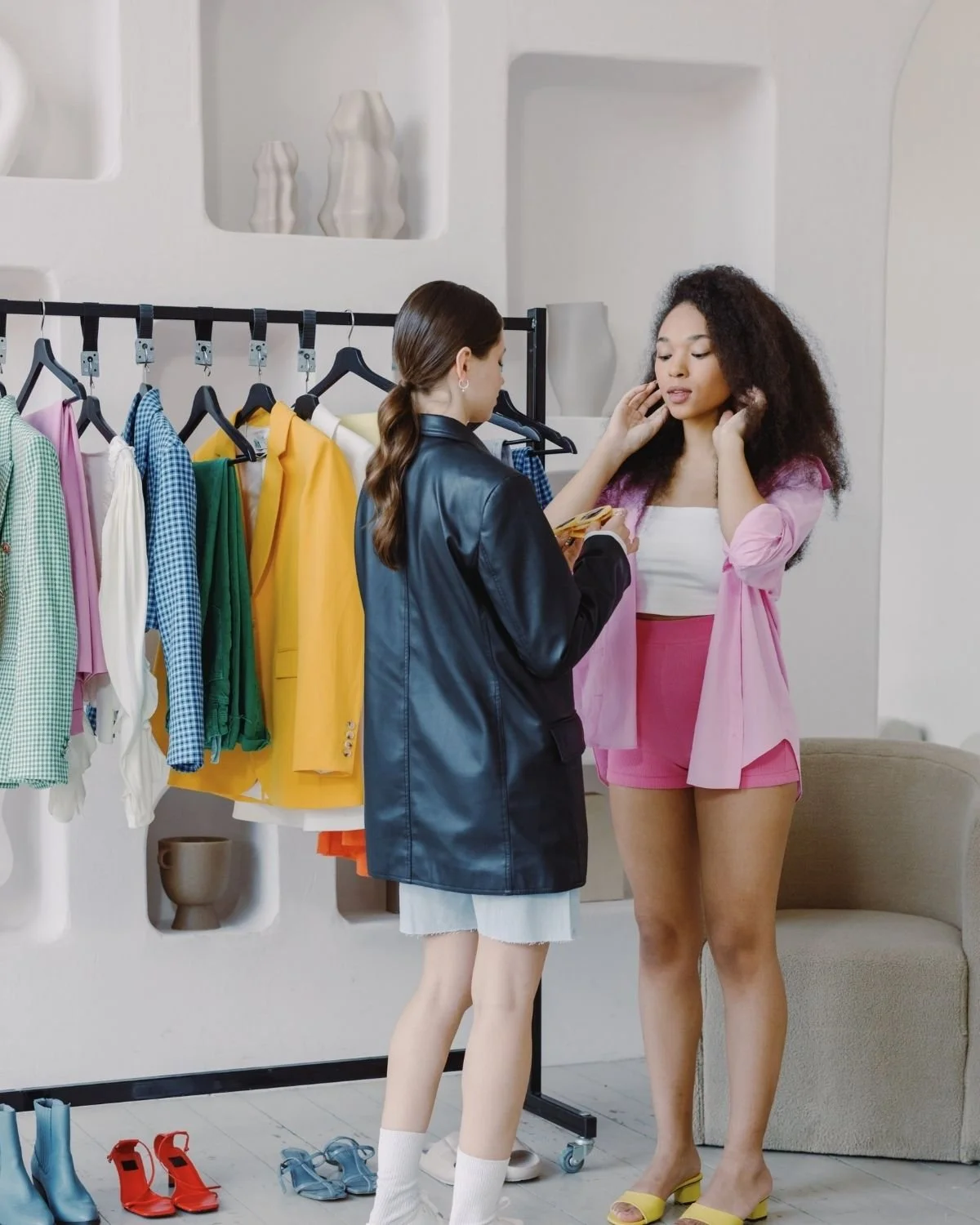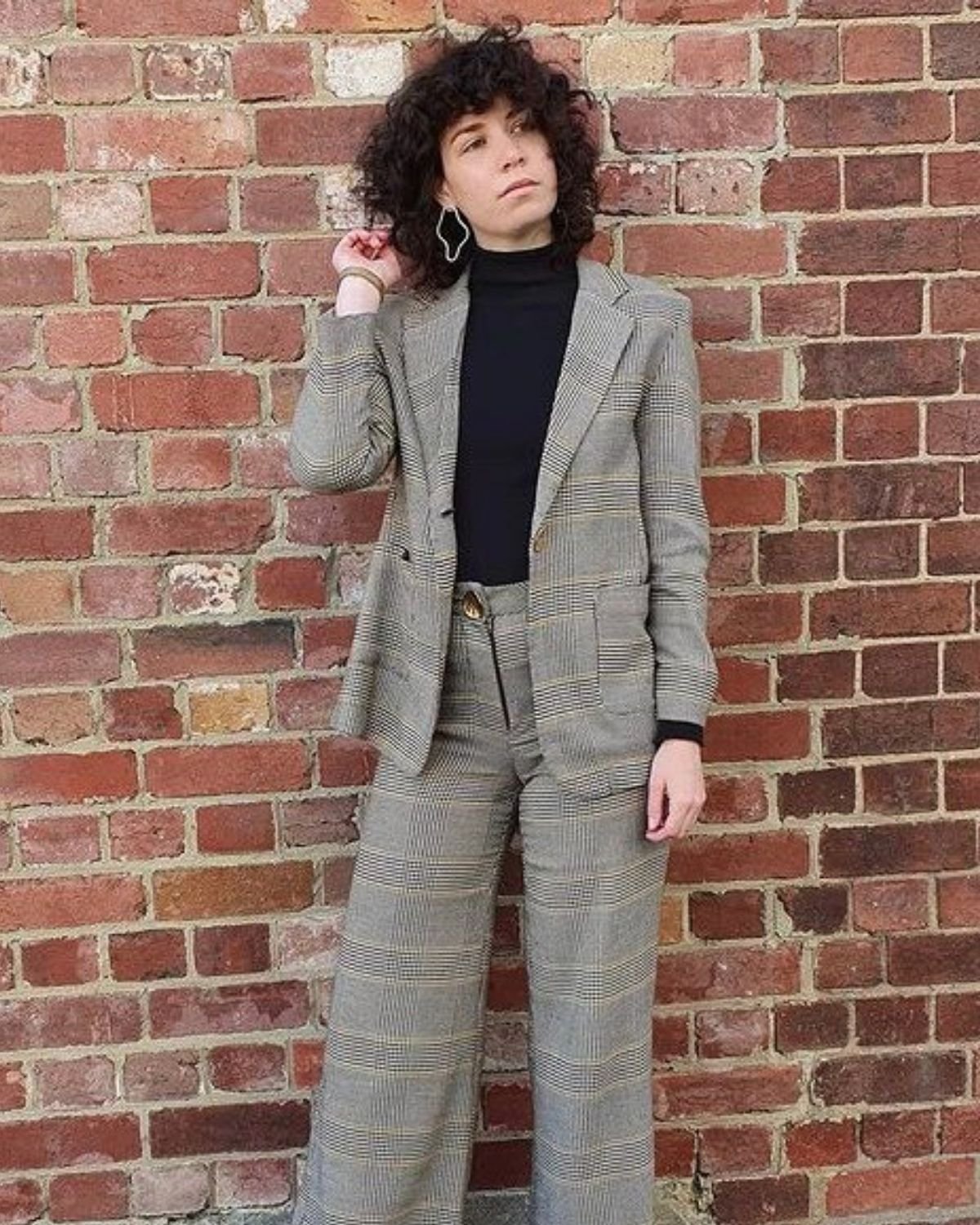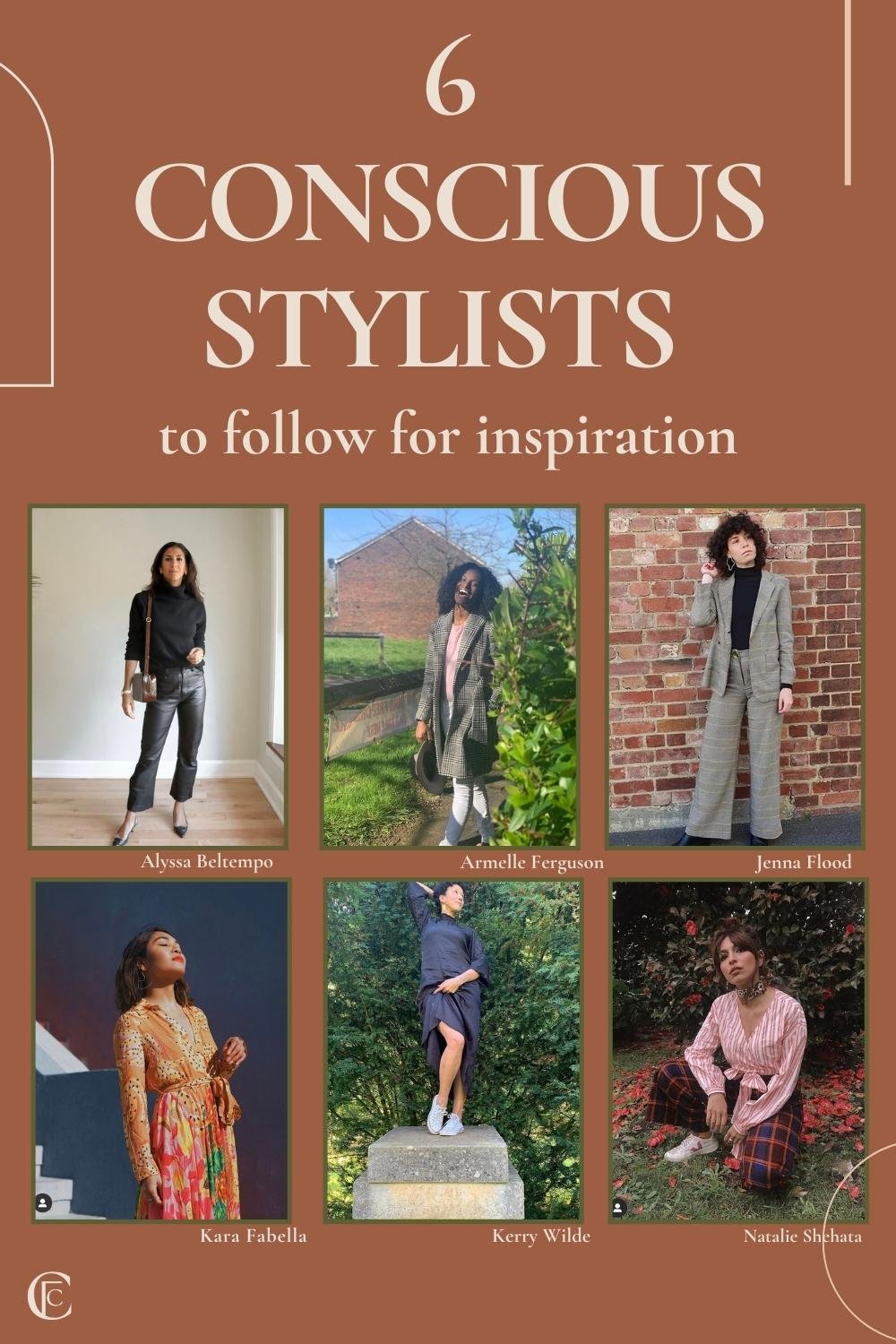The Role of Sustainable Fashion Stylists in the Slow Fashion Movement — Plus 7 Conscious Stylists to Follow
By Stella Hertantyo
There is no doubt in my mind that to slow down the pace of the fashion industry, we will all have to redefine our relationships with our clothing and focus on what style really means to us, instead of what fashion tells us is trending.
Fashion stylists have a role to play in this shift, because they are the storytellers of the fashion industry. They shape the way we view, engage with, and create aspirations about clothing.
While we often only see the final product of their work, the careful consideration of fashion stylists is what is behind all the iconic fashion images, celebrity red carpet looks, brand photos, and even some people’s personal style.
Recently, as slow fashion values become more prominent in the fashion industry, I have noticed a rise in stylists who are titling themselves as ‘conscious’, ‘ethical’, or ‘eco’ stylists.
More broadly, this is seen as the rise of the sustainable stylist.
We often talk about the future of fashion as a tapestry of different people, brands, and organizations working together to reimagine the fashion landscape and how it can be a force for good instead of an industry defined by excessive waste and exploitation.
This got me thinking: Within this tapestry, what role could sustainable fashion stylists play in working towards a more just and sustainable future of fashion?
What do fashion stylists do?
Typically, fashion stylists work for individuals, fashion houses, or clothing brands. Their main role is to provide fashion advice, select garments, and coordinate outfits for models in shoots, or actors in films.
Fashion stylists work in different spaces, including personal styling, e-commerce, catwalk, and in the film, advertising, and television industries.
While traditional fashion stylists are often key cogs in the capitalistic fashion system that is constantly trying to convince us that we need to buy more to remain in style, there is a new generation of stylists on the rise: sustainable fashion stylists.
So, what makes sustainable fashion stylists different?
Just like traditional fashion stylists, sustainable fashion stylists work in a variety of spaces. The difference is their focus.
While all stylists focus on style, sustainable fashion stylists pay homage to context and situate style within a broader fashion system that has significant impacts on the planet and people.
As sustainable fashion educator and founder of Eco Styles, Nina Gbor, explained in an episode of the PROTECT podcast, “An eco stylist does what a personal stylist does – making people look good and feel good in what they wear. But, on top of that, they are also educators, because they bring the topics of sustainability, slow fashion, and ethical fashion into the conversation about clothing.”
Essentially, sustainable fashion stylists help people embrace style as a means of expression, while also guiding them to make decisions that center care and acknowledge the impact of the fashion industry on the planet and people.
What role do sustainable fashion stylists play in the slow fashion movement?
To a large degree, fashion stylists shape how we view and value clothing.
Firstly, through the types of brands that are included in shoots and personal stylist shopping directories, sustainable fashion stylists have the power to highlight brands that are positively contributing to the slow fashion movement and going against the status quo.
Sustainable fashion stylists can help shift our aspirations about clothing by emphasizing creativity and transparency. For example, recently there have been numerous occasions of celebrities outfit repeating on a world stage.
Another memorable example is when Emma Watson went on a press tour and created a dedicated Instagram account at the time to offer transparency behind her and her stylists' choices.
When we see slow fashion practices – such as outfit repeating or choosing secondhand over new – reflected in the media and embraced by influential people, it contributes to the normalization of an alternative approach to fashion.
When it comes to personal style, sustainable fashion stylists help people to better understand their wardrobes and make fashion choices that align with their values and the values of the slow fashion movement.
Sustainable fashion stylists who offer personal styling services generally aim to encourage the inherent creativity that can arise from working with what we already have. In a Conscious Style podcast episode, sustainable wardrobe stylist Alyssa Beltempo emphasizes the importance of prioritizing creativity over consumption. This mindset helps us reclaim materialism and speaks to a redefinition of the bond we have with our clothing.
This involves sharing tips on how to reimagine and restyle existing wardrobe items, as well as introducing clients to practices such as mending, repairing, swapping, renting, and tailoring. When it comes to acquiring new items, sustainable stylists can suggest conscious brands and guide their clients away from brands that are known for greenwashing.
So, sustainable fashion stylists help shift our perceptions of sustainable fashion by gently guiding us through how to incorporate it into our own lives and wardrobes.
Beyond just the clothes, sustainable fashion stylists often play an important role in how clothes are represented, and on what kinds of bodies, in photo shoots, marketing campaigns, and fashion media. The images that shape how we view fashion have direct impacts on our perceptions and actions within the industry.
By intentionally including people who have been historically underrepresented in the fashion industry - due to racism, ableism, size exclusivity, and the erasure of queer personhoods - sustainable fashion stylists contribute to creating a more holistic and inclusive representation of slow fashion, beyond tokenistic attempts.
This is vital because as much as slow fashion is about supply chain transformation, it is also about inclusivity, justice, and making sure that everyone feels welcomed, celebrated, and seen in the future of fashion.
But are sustainable fashion stylists just promoting a different kind of consumption?
Aside from personal wardrobe styling, at its core, a stylist’s job is to make clothing compelling to buy.
This creates a sense of tension, because we also know that the simplest solution to the issue of fast fashion is to reduce consumption and find ways to care for and rewear our clothes.
While we do need to – very urgently – find ways to reduce overconsumption, it is so important to highlight, celebrate and amplify the work of brands taking a more conscious approach to fashion.
These brands are also a part of the tapestry of change, because they are collectively creating an image of what an alternative industry – centered on values of reciprocity, regeneration, justice, care, transparency, and accountability – could look like.
Interestingly, with this tension in mind, not all stylists who prioritize a slow fashion approach refer to themselves as ‘sustainable fashion stylists’.
One such stylist is Rachael Wang who does not refer to herself as a sustainable stylist, because it feels like an oxymoron. Instead, as explained in this Atmos article, Wang regards herself as a stylist that cares about being an ethical person and has decided to remain in the fashion industry, because there is power in people with a conscience remaining within the industry and leveraging their connections to create change from the inside.
On the flip side, this does not mean that all stylists who refer to themselves as ‘sustainable’ are unaware of the slight oxymoron or do not acknowledge this tension. Other stylists recognize that purchasing new items is not a sustainable act and while they do share conscious brands that their clients can invest in, they also share tips on how to embrace the clothes they already have.
And, many sustainable stylists are challenging the very role of a stylist and dissociating style from consumption, entirely. It is important to note that not all sustainable stylists focus on promoting new products. Instead, they prioritize sharing creative ways that we can work with what we already have to enhance personal style and clothing as a means for expression.
So, perhaps people that term themselves ‘sustainable fashion stylists’ are not doing so because they are unaware of the contradictions, but rather as an indicator they are going against the status quo.
And, at a certain level, we also need to take responsibility for our own actions and habits. As consumers, we need to be more aware of how much we are buying and draw our own boundaries about when and why we consume.
There will always be contradictions in this industry, but that does not mean we should write off imperfect solutions. Sure, it will never be sustainable to convince people to constantly buy more. But, sharing ways for people to discover brands that are doing good, and ways to wear your clothing in different ways is an important part of this movement.
7 conscious stylists to follow for inspiration on how to reimagine your wardrobe:
I use the word ‘conscious’ here, because each stylist identifies slightly differently. Just as slow fashion doesn’t look the same for everyone, each stylist has a slightly different approach.
If you are interested in finding out more about the intricacies of conscious styling, take a look at the work of these seven people:
Alyssa Beltempo
Alyssa is a sustainable wardrobe stylist who is passionate about encouraging people to shop less and love what they already have more. She lives and styles by the ethos of ‘creativity over consumption’ and has a YouTube channel where she shares videos about just that, as well as offering various virtual styling services and workshops to guide you as you re-discover your own closet.
Armelle Ferguson
Armelle is an Ethical Personal Stylist & Sustainability Coach who aims to show people that it is possible to be both sustainable and stylish. Through a carefully considered step-by-step process, called Sustainably Styled, and various resources, Armelle helps people curate their wardrobes so that they can wear their values while looking and feeling good at the same time.
Jenna Flood
Jenna is a slow fashion stylist and the founder of Ironic Minimalist, who focuses on educating people about the impacts and harm of the fast fashion industry. Jenna offers sustainable styling packages and workshops that help people define their style beyond trends while encouraging people to try more sustainable alternatives, such as second hand, vintage, and clothes made with slow fashion principles at heart.
Kara Fabella
Kara is a BIPOC content creator, sustainable lifestyle advocate, and ethical fashion stylist. She offers ethical styling services, wardrobe styling, and creative direction through her page called ‘The Flipp Side of Style’. Kara has an impeccable eye for color combos and believes that the embracing of color and texture has made the slow fashion movement more inclusive.
Kerry Wilde
Kerry calls herself a ‘soul stylist’ and is passionate about connecting women to their greatness through the union of personal styling and embodiment practices. Kerry believes that a sentimental attachment to our clothing is the missing link for sustainability. She offers Soul Style Mentorship, Bespoke Personal Styling, and B2B Brand Consultancy support.
Natalie Shehata
Natalie is an Eco Stylist and the founder of tommie magazine – an online and real-life community, that provides a platform for critical conversation and connection within the sustainable fashion discourse. She is currently the National Retail Eco Stylist for the Save the Children Australia op shops and, through the various mediums of her work, is on a mission to change the stigma around preloved fashion and the intersectionalities that that includes.
Nina Gbor
Nina Gbor is an Eco Stylist and founder of Eco Styles. Nina coined the phrase ‘get off the fashion treadmill’ which emphasizes that expression and self-awareness should be the premise for consuming clothing, not fashion trends. Through various eco styling services, events, and workshops, Nina helps her clients learn how to acquire, use, and dispose of clothes in ways that are considerate of the planet and people.
Sustainable fashion stylists are focused on cultivating an alternative narrative of the fashion industry, spotlighting conscious brands, helping people to understand their wardrobes better, and encouraging us to foster an emotional connection with our clothes.
They have a vital role to play in how sustainability is viewed, engaged with, communicated, and represented. This creates new kinds of fashion imaginaries, aspirations, and change-making ripples across the industry.
ABOUT THE AUTHOR:
Stella Hertantyo is based in Cape Town, South Africa, and is currently completing her PGDip in Sustainable Development to accompany her undergraduate in Multimedia journalism. She is a slow-living enthusiast and a lover of low-impact fashion.
She is passionate about encouraging an approach to sustainability that is inclusive, accessible, and fun as we try to figure out how to create a more sustainable and just world, together.
When Stella is not in front of her laptop doing uni work, you'll probably find her reading, writing, illustrating, or baking/cooking. A dip in the ocean, or a walk in the mountains, are the two things that bring her the most peace.













